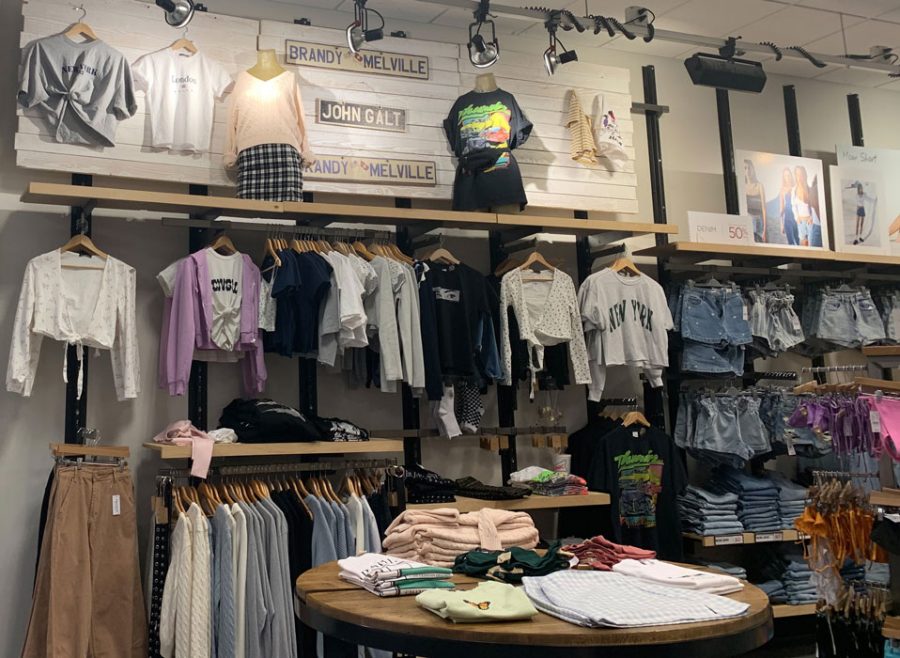Commentary: Brandy Melville’s ‘One-Size-Fits-All’ Is Bunk
March 25, 2020
It is safe to say that the majority of teen-age girls in New Mexico as well as across the United States are familiar with the one-size-fits-all clothing store “Brandy Melville.” In spite of how convenient the one-size-fits-all policy appears to be, it sparks an enormous amount of conflict for girls across the world. The idea of branding one-size-fits-all products is extremely unrealistic, and for girls who don’t live up to Brandy’s ideal body image, it can be nearly impossible to find clothing items that fit well.
Founded in 1970, Brandy Melville is now in collaboration with PacSun and has locations across the United States and in Australia, the United Kingdom, and Spain.
Selling products that fit one body type and one body type conveys the message to girls that their bodies have to be a particular weight, size, height, etc. It promotes the idea that there is only one body type and that if you don’t fit it, you simply can’t buy products from that store.
Although the majority of their products are one size only, some, such as their jeans, do come in two or three different sizes. However, this range of sizes still isn’t enough to promote a healthy range for girls, considering that they don’t even need a standard in the first place.
Amanda Prahl, a writer for the multi-media platform Popsugar, writes that for Brandy Melville, “It’s pretty clear that one size doesn’t fit all, and it’s also pretty clear which sizes are considered the ‘universal’ default for this brand.” Prahl also writes, “The models on [Brandy Melville’s] Instagram seem to confirm it, with pictures of thin models across the board and no diverse body types of any kind.”
Prahl also explains that many people in the past have questioned Brandy Melville’s reasoning for their “one-size-fits-all” guideline, but that the company has merely brushed it off. In 2013, company executive Jessy Longo said, “We can satisfy almost everybody, but not everybody,” thus showing the company’s severe disinterest in the idea of expanding its size offerings.
In addition, Prahl writes, “The brand’s ‘one size’ typically corresponds to a size zero, with waists around 24 to 25 inches. Meanwhile, the CDC’s numbers in a 2016 study suggested the average waist size for females between 13 and 19 years of age is 32.6 inches.”
In another article for the women’s entertainment platform HelloGiggles, journalist Kit Steinkellner writes, “The store does not carry multiple sizes because they have made a choice as a company that they will only cater to the slimmest of bodies. Clicking through the website, you see 5’7” models with 24-inch waists, 5’9 models with 25-inch waists, and 5’8 models with 23-inch waists, a very specific body type that represents such a small part of the population.”
Both writers make the point that Brandy Melville simply chooses to represent only one body type, and in doing so, they are targeting specific customers for their store.
Steinkellner makes the point that it’s reasonable to only provide certain sizes for their store considering that the majority of their customers are teen-age girls. However, they fail to acknowledge that not every teen-age girl is one specific body type.
SFHS Junior Lily Lardon expresses her opinion of Brandy Melville: “I don’t necessarily have an issue, aesthetically, with Brandy Melville. I think the clothes are cute, on-trend, and fit me well. I do, however, have a problem with the fact that they exclude other girls.”
Additionally, Lily says, “I think the image that they project is incredibly harmful. The one-size-fits-all policy, along with the ridiculously high prices and the types of models on their social media, targets teens who are in a stable financial position, petite, conventionally pretty, and Caucasian. It gives the girls who own pieces from the brand a feeling of being a part of a special, popular group—a clique.” She goes on to say that this frustrates her because she really loves some of the clothes they sell.
A clothing company that promotes the idea of one specific body type is unjust. It promotes unhealthy standards for girls and excludes girls who don’t live up to its unnecessary and unrealistic standards. Body diversity should be appreciated and supported through clothing expression, not discriminated against and pushed aside.
Brandy Melville promotes the idea that their clothing “fits most- to all” body types when in reality, it only fits one specific body type. The hypocrisy of their policy is their failure to live up to it.


